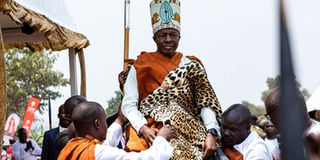Humans were created to be kings

Kabaka Mutebi II celebrated his 30th Coronation anniversary on July 31. PHOTO | FILE
What you need to know:
- FYI. The monarchy helps to give a sense of community life, of work, of success, of excellency, of voluntarism, teh values of Buganda Kingdom, writes Msgr. John Wynand Katende.
“What are humans that you are mindful of them, mere mortals that you care for them? Yet you have made them little less than a god, crowned them with glory and honor,” (Psalm 8:6).
Within this the context of this Psalm, I wish to reflect on the recent celebration of the 30th Coronation anniversary of Ssabasajja Fredrick Ronald Muwenda Mutebi II, the 36th King of Buganda, and the significance of the monarchical mode of governance in human society.
Buganda is a nation within a nation and a kingdom within the Republic of Uganda. Earlier known as Muwawa, it’s history dates far back, over 3,000 years. The Buganda monarchy was, however, established in 1200s, being the oldest and largest of the medieval kingdoms in East Africa. It has a constitution, a parliament, a prime minister, clan leaders and local chiefs.
Psalm 8 reflects Genesis 1:26-28, which reveals God’s decision to create humans in His own image and likeness. In the same vein, King David marvels at man’s awesome responsibility, to be king over the rest of creatures. Yet, God would still be the overall King.
To be king is to have authority over oneself and over others. The king must be anointed by God; the King of kings (Daniel 2:37). There must be the mark of God’s presence in his life. The kings of Israel were believed to serve as God’s agents to rule the nation. They were expected to observe his covenant and laws, to defend the nation and engage in offensive war when deemed necessary, and to rule the people with justice and righteousness.
When humans failed to observe God’s reign over them and sinned, however, the dominion of mankind over creation crumbled; right from the level of the family (Genesis 3). The ‘Fall’ demonstrated the fallacy of human independence of God.
Then, God chose Noah, a man of integrity, to bring forth a race that would, once again, dominate creation (Genesis 9:1-7). With the emergence of large societies, the kings would be arbiters of discord, the benefactors of the weak and poor, and the leaders in conflict against hostile powers. To some extent, this was at the heart of Israelite monarchy.
Anointed by Samuel, King David was filled with power of God’s Spirit (1 Samuel 16:12). The Royal Psalms, in the Bible, celebrate the kingship of both God and His anointed one, David. The David royal lineage would be a channel of world redemption. He would beget the messiah King, Jesus Christ.
The New testament introduces Jesus, not only the King of Israel, but also of all mankind, of the world. At the beginning of His life, Magi came to Herod, asking where they could find the King of the Jews (Matthew 2:2). At the end of His life, Pilate asked Him, “Are you the King of the Jews?” He affirmed that He was, and Pilate sanctioned His crucifixion on that basis (Matthew 27:11-12, 37).
Jesus tells us that His Kingdom is not something tangible and observable, but is within us (Luke 17:20). Kingship begins with the individual self. To endow them with self-governance, from within, God gave humans a moral code. We have the Ten Commandments and the Beatitudes (Exodus 20, Matthew 5). God also appoints prophets/religious leaders to remind everyone of this important way of life.
The monarchy helps to give a sense of community life, of work, of success, of excellency, of voluntarism, of social harmony and development, of hospitality, of the sacred, of the sacredness of life and religion, of time and of respect for authority and the elders. These are the key values that Buganda Kingdom must continue cherishing to regain its past glory and hegemony in modern Uganda.





